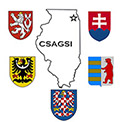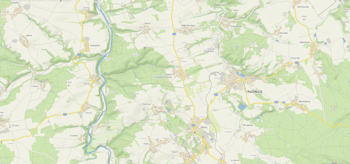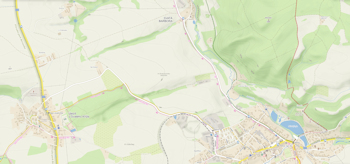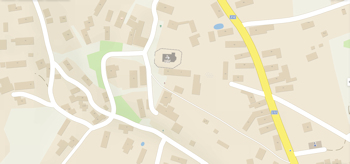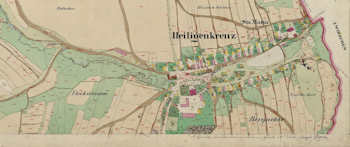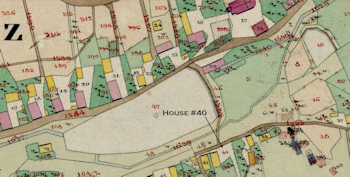John Cervenka
Brewer - Business Man - Politician
Supporter of Chicago's Czech Community
John Albert Cervenka was born in 1870 in a small town in Bohemia. He died in 1951 in Chicago. In the years between; he married and raised a family, became a very successful business man, held numerous elected and appointed positions in the City of Chicago and Cook County government, joined and led a variety of Czech Chicago organizations, and was a very strong supporter of Czech culture and the establishment of the nation of Czechoslovakia.
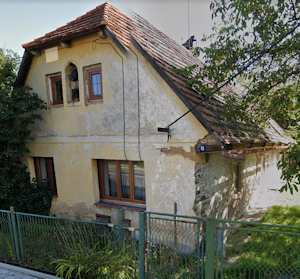 Born February 5, 1870 at Újezd u Svatého Kříže #40, (view birth record) (1) area of Radnice, district of Plzen, John came to the United States in 1882 with his parents, John and Marie, four brothers and one sister. Two other brothers would arrive on their own. This is not the only Cervenka family from the small villages in the area of Radnice to arrive in the United States and live in Chicago. John, his parents, and all of his siblings, are buried in Chicago’s Bohemian National Cemetery.
Born February 5, 1870 at Újezd u Svatého Kříže #40, (view birth record) (1) area of Radnice, district of Plzen, John came to the United States in 1882 with his parents, John and Marie, four brothers and one sister. Two other brothers would arrive on their own. This is not the only Cervenka family from the small villages in the area of Radnice to arrive in the United States and live in Chicago. John, his parents, and all of his siblings, are buried in Chicago’s Bohemian National Cemetery.
Home Left - Image of current house #40 from Google Maps. (Google Maps has images of the church - Kostel Povýšení svatého Kříže - where he may have been baptized. It is just down the road. Google images indicate that the church is currently not open.)
Images Above: Source - www.mapy.cz - with the three primary locations for this Cervenka family - Uzezd u Svateho Krize (Heilvoenkreuz), Svata Barbora and Kamenec (Weisgrunn)
Image Below - www.mapy.cz - close up of Uzezd u Svarteho Krize with village home #40 located
Images Below - https://ags.cuzk.cz/archiv/ - Historic Cadastre Map with village home #40 located and Kostel Povseni Svateho Krize (church) also located.
John's parents, Jan Cervenka and Marie Holub, were married in 1858. They would have seven known children born in Bohemia. Departing from Hamburg on 5-14-1882, listing Kriz as the last residence, and arriving at New York City on 5-26-1882, aboard the ship Cimbria: Jan Cervenka 53, Marie 37, Anton 9, Anna 8, Jan 7, Karl 6. (2) Sons Joseph, Frank, and Vaclav are not listed, but they also would arrive and live in Chicago.
On May 30, 1890 John Cervenka married Antonie Bolek. Antonie Bolek was born on 5-18-1869 at Vrdy #69, district of Kutna Hora. (view birth record) It seems that Antonie arrived in Baltimore on 11-10-1887 aboard the ship Donau and her parents arrived two years later. (Parents Vincent and Aloise are also buried in BNC).
While John, his father John, and his brothers all appear to have been experienced in wood working and the trade of carpentry and cabinet building, (during the 1890's, he was a member of the Wood Workers' Council of Chicago) John was already a business man in 1899. While running for political office in 1910, his newspaper campaign ad indicated that he became a restaurant, hall owner and saloon keeper by 1899 on the corner of 19th and Blue Island Avenue. The 1900 census lists John as a saloon keeper, living at 621 Blue Island avenue with wife, Antonie, and children, Alice and John. (3) Cervenka joined all the merchants on Blue Island Avenue between 17th and 20th streets. Previously named Black Road, Blue Island Avenue was a thriving Bohemian commercial area. In 1901 and 1902 they held parades and maintained a light festival along Blue Island to promote their businesses and to encourage the city to extend transporation lines down Blue Island. (4)
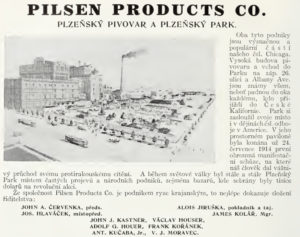 In three short years, John Cervenka would transition from a saloon keeper to the president of a brewery, a position he held for decades. The Chicago Tribune on September 17, 1903, Page 15, listed new incorporations: "Pilsen Brewing company, Chicago; capital, $100,000; operating a brewery; incorporators, John Cervenka, Joseph Kovar, Joseph Souhrada. In 1907 adjacent land had been purchased and Pilsen Park, a community gathering center, was also established. (5) Image Left (6)
In three short years, John Cervenka would transition from a saloon keeper to the president of a brewery, a position he held for decades. The Chicago Tribune on September 17, 1903, Page 15, listed new incorporations: "Pilsen Brewing company, Chicago; capital, $100,000; operating a brewery; incorporators, John Cervenka, Joseph Kovar, Joseph Souhrada. In 1907 adjacent land had been purchased and Pilsen Park, a community gathering center, was also established. (5) Image Left (6)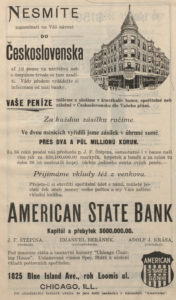
Not all of John Cervenka's ventures would prove successful. Several years later he participated in the incorporation of an amusement park. (7) The Cream City Amusement Park did not stay in operation very long. (8)
While participation in many Bohemian societies and community activities, along with a deepening involvement 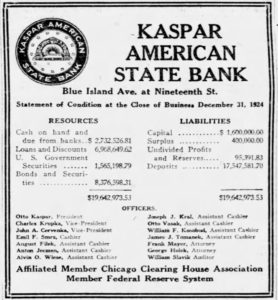 in county and city politics would occupy more of Cervenka's time, he still remained a business man. Not only with the Pilsen Brewery, as by 1918 he was also a board member of another Bohemian business, the American State Bank, also on Blue Island Avenue. (9) Cervenka's March 31, 1923 campaign ad (for City of Chicago Treasuer) lists he was a director and vice president of the American State Bank for six years. (10) The Kaspar and American State Banks merged in 1924. Cervenka is listed as a vice president of the newly merged banks in 1925. (11)
in county and city politics would occupy more of Cervenka's time, he still remained a business man. Not only with the Pilsen Brewery, as by 1918 he was also a board member of another Bohemian business, the American State Bank, also on Blue Island Avenue. (9) Cervenka's March 31, 1923 campaign ad (for City of Chicago Treasuer) lists he was a director and vice president of the American State Bank for six years. (10) The Kaspar and American State Banks merged in 1924. Cervenka is listed as a vice president of the newly merged banks in 1925. (11)
Cervenka's participation in the world of business, and his fervent support of the Chicago Czech community, and the newly established nation of Czechoslovakia, led to his involvement in the creation of the Czech-Slovak Chamber of Commerce (branches in many USA cities). He was an early president. The organization sought to develop trade between the USA and the newly formed nation. (12)
Chicago's large Bohemian population had been flexing its political muscle for a number of years, and soon John Cervenka moved to the forefront of their activities. Cervenka was active in Cook County and City of Chicago government during the time of Henry Horner 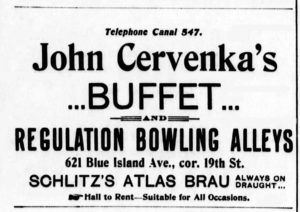 (Czech and Illinois' first Jewish governor), Anton Cermak, Charles Vopicka and Otto Kerner.
(Czech and Illinois' first Jewish governor), Anton Cermak, Charles Vopicka and Otto Kerner.
Chicago wards with large numbers of Bohemian and Slovak citizens began to turn out and support their own countrymen in city, county and state elections. In 1902 Cervenka became a candidate for alderman of the tenth ward. All year long a newspaper carried an advertisement, though not stating anything, could have been part of his campaign strategy. No article has been found indicating he was successful in this election. (13)
Cervenka's next known foray into the political world was a run for clerk of the Cook County Probate Court in 1910. He was successful in that election. In the same year he became a member of the Chicago Plan Commission. For the 1910 election, Charles Vopicka, a former Illinois Congressman of the Fifth District, was on the ticket for president of the Cook County Board. In 1912, John Cervenka ran again for clerk of the Cook County Probate Court. He was joined on the ticket by Henry Horner who was the candidate for Judge of the Cook County Probate Court. In 1913, a newspaper article describes Chief Baliff Anton J. Cermak of the Municipal Court, Charles J. Vopicka, and John A. Cervenka involved in a conference meeting with Mayor Harrison which centered on Anton Cermak having chosen Otto Kerner as a replacement  Alderman in the 12th Ward. (14) In 1914 Cervenka and Horner once again were on the ballot for similar positions. This continued through the elections of 1918, when Cervenka was also elected to the Cook County Board of Assessors. That election included Otto Kerner, lawyer, seeking to be nominated as as Assoicate Judge of the Municipal Court. (15)
Alderman in the 12th Ward. (14) In 1914 Cervenka and Horner once again were on the ballot for similar positions. This continued through the elections of 1918, when Cervenka was also elected to the Cook County Board of Assessors. That election included Otto Kerner, lawyer, seeking to be nominated as as Assoicate Judge of the Municipal Court. (15)
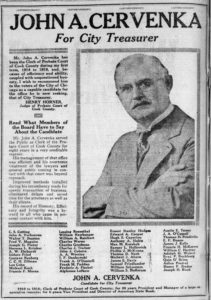 One could imagine that: the growing name recognition of Cervenka in city and county politics; his string of election victories to elected positions; the increasing political power of the area's Bohemian community and their power base in several Chicago wards; his success as a businessman; his knowledge and his invlovement in Chicago's banking industry; his election to the Board of Assessors; and the movement of his Bohemian political friends up the ladder of elected positions; would all play a role in Cervenka's successful election for the office of Treasurer for the City of Chicago.
One could imagine that: the growing name recognition of Cervenka in city and county politics; his string of election victories to elected positions; the increasing political power of the area's Bohemian community and their power base in several Chicago wards; his success as a businessman; his knowledge and his invlovement in Chicago's banking industry; his election to the Board of Assessors; and the movement of his Bohemian political friends up the ladder of elected positions; would all play a role in Cervenka's successful election for the office of Treasurer for the City of Chicago.
Over the course of time a national debate between the "Drys" and the "Wets" grew in the United States. It culminated with the ratifying of the 18th Amendment which ended the making, sale and transportation of alcoholic beverages in the USA. Cervenka was a participant in the debate. As a saloon keeper, and then president of Pilsen Brewing, he, and his fellow businessmen in the brewing business, argued for and supported the rights of businessmen and their customers to purchase their products (beer their main objective). Prohibiiton did not close the breweries of Chicago. Many turned to other non alcoholic beverages made with malt, or other items with malt. The term "near beer" was used as breweries made non alcoholic beer. For Cervenka the head of a Chicago brewery, and Cervenka, the City of Chicago Treasuer, those two roles met as the Washington D.C. district attorney, Edwin A. Olsen accused "city treasurer of Chicago conducted one of the biggest of the city's unlawful breweries." Cervenka would be indicted, but no trial ever took place. In that newspaper article, Cervenka replied: "Olson wants to cloud the issue and cover up the fact that the government can't cope with the situation." said Mr. Cervenka. "I have headed the Pilsen company for 26 years. I didn't enter the business after prohitition came. That brewery hasn't turned a wheel in the last three years. Nor will it again manufacture even near beer. It is not an unlawful brewery and never has been one. " "Prohibition is not a success and never will be. My idea of prohibition is that as long as grapes are grown there will be wine. Mankind never will uphold laws that are thrust down its throat."
"In 1923 the government agents raided the Pilsen Products company and Mr. Cervenka and others were indicted. We were making near beer at that time, Mr. Cervenka said. To do that we first had to make real beer, the dealcoholizde it." (16)
Upon the election of Anton Cermak as Mayor of the City of Chicago, John Cervenka took on a new role, listed as a "acting city purchasing agent", and continuing in similar fashion as superintendent of the city bureau of central purchasing until January 1, of 1948. (17)
John Cervenka's participation in Chicago business and local government did not diminish his involvement in supporting local Bohemian community organizations and activities, nor his desire to support the creation and success of the new nation of Czechoslovakia.
It would appear to be sensible that a number of the organizations, and activities surrounding them, would be related to the events in Cervenka's life. His father, and male siblngs, had skills related to wood working. Early in his work career, John was a wood worker and became a member of the wood worker's union, participating in the Amalgamated Wood Workers' Union and eventually representing them. (18) When he opened his saloon and hall he became a member of the local merchants association, helping to organize and host events within the Bohemian business community along Blue Island Avenue. (19)
A unique organization emerged in Chicago and elsewhere. It was the "Sane Fourth of July" movement. Concern grew over the number of accidents associated with Fourth of July fireworks usage, so much so that parades were held to promote safe Fourth of July events. Local newspapers spread the word and the movement developed for a number of years. In 1911 Chicago papers described the large events and parade to be held. The Bohemian community played a major role in the events and John Cervenka was honored by being the Parade Marshall for the year. (20)
Throughout World War One, Cervenka was a strong supporter of Masaryk and the push for an independent Czechoslovakia. Cervenka worked with other Czech community leaders raising funds for the purchase of Liberty Bonds. When nation of Czechoslovakia was established he became a member of the Czechoslovak Trade Congress to foster economic ties between the USA and the new nation. He was also involved in fund raising to support the families of the famous Czechoslovak Legionaires. When Germany began its march into Czechslovakia, he was again rallying efforts to fund and support wounded Czech soldiers. (21)
John Albert Cervenka never forgot his fellow Chicago Czechs who needed help. He would fund raise for, serve on committees and work with other Czech community leaders to provide help through (Ceska Dobrocinna Spolecnost) the Bohemian Charitable Association. (22) The same held true for (Utulna A Sirotcinnec) the Bohemian Old People's Home and Orphanage. (23) Also, for (Spolek Cesko-Americka Nemocnice) the Czech-American Hospital Association. (24) Cervenka served on committees, the governing boards, and often as President of these groups.
John Cervenka was actively involved in the World's Fair on 1933. Czechs in Chicago and in Czechoslovakia were his focus, and of course one could expect he would play a major role in something he was most familiar with. He was the chairman of the Czechoslovakian section, committee on nationalities. (25) It is no doubt that the founder of one of Chicago's largest breweries would also not be part of "Thousand Barrels of Free Beer at Fair". (26)
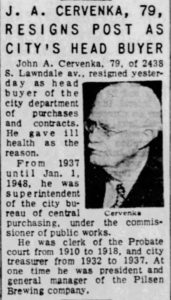 John Cervenka ended his involvement in most of his activities by 1949, as he announced his retirement from the political arena. John died in 1951. His wife Antonie Bolek Cervenka had died in 1924. John continued to live with his son John Jr. and his family at 2438 Lawndale, until the time of his death.
John Cervenka ended his involvement in most of his activities by 1949, as he announced his retirement from the political arena. John died in 1951. His wife Antonie Bolek Cervenka had died in 1924. John continued to live with his son John Jr. and his family at 2438 Lawndale, until the time of his death.
John A. Cervenka, 81, of 2438 S. Lawndale av., a political leader for 50 years among Chicagoans of Bohemian, ancestry, died yesterday in his home. He had been ill for six months.
He was president of the Pilsen Brewing Company, 26th st., and Albany av., from its founding in 1904 until his retirement in 1949. He held elective and appointive offices in local government for 40 years before retiring.
Mr. Cervenka was born in what is now Czechoslovakia on Feb. 5, 1870, came to Chicago when 12 and became a cabinet maker. By 1899, he was prominent in the Bohemian community and operated a retail liquor and restaurant business at 19th st. and Blue Island av.
Mr. Cervenka, a political ally of the late Mayor Anton J. Cermak, was clerk of Probate Court from 1910 to 1918 and city treasurer from 1923 to 1927. He became city purchasing agent under Cermak's administrtion in 1931 and continued in various capacities with the purchasing bureau until his retirement.
Among his other public positions was that of count purchasing agent. He was a member of the Chicago Plan commission many years.
In 1923, while he was city treasurer, Mr. Cervenka was indicted by the federal grand jury on a charge that illegal beer was being made in the Pilsen brewery. The case never came to trial. He contended the brewery had been closed.
Mr. Cervenka's wife, Antonie, died in 1924. A son, John A. Jr., an attorney, and a daughter, Mrs. Alice Rohde, survive. Services will be held at 2pm Saturday in the Lawndale Masonic temple, 2300 Millard av.
John and Antonie are buried in Lot 265 Section 14 of Bohemian National Cemetery. His son, John Jr., his wife Mae, and John's daughter, Alice Rohde are all buried in Lots 264 and 263.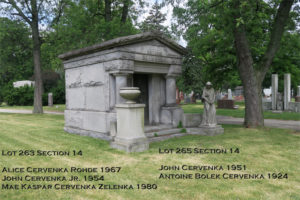
John Cervenka Find A Grave# 142378495
Antonie Bolek Cervenka Find A Grave # 115716313
John Cervenk Jr. Find A Grave # 240243986
Mae Kaspar Cervenka Find A Grave # 240280894
Alice Cervenka Rohde Find A Grave # 240281792
Cervenka family Census Records
1900 Illinois Cook Chicago Ward 9 D0238 Page 14 at 621 Blue Island Avenue
John Cervenka 29, Antonie 27, Alice 8, John 2
Living at the same address Vincent, 51, ( Find A Grave# 139226434) and Alice, 51, (Find A Grave# 139226423) Bolek, the parents of John’s wife, Antonia.
1910 Illinois Cook Chicago Ward 34 D1484 Page 46 at 2356 Clifton Park
Antonia Cervenka 35, John 34, Alice 18, John 12
1920 Illinois Cook Chicago Ward 34 D2180 Page 5 at 2438 Lawndale
John Cervenka 49, Antonette 47, John Jr. 22
1930 Illinois Cook Chicago D0829 Page 32 at 2848 Lawndale
John Cervenka 60, John 32, Mae 32
1940 Illinois Cook Chicago 103-1442 Page 6 at 2438 Lawndale
John Cervenka 70, John 42, Mae 42, John 7
1950 Illinois Cook Chicago 103-2177 Page 10 at 2438 Lawndale
John Cervenka 80, John Jr. 52, Mae 50, John III 17
References:
1. Birth John Albert Cervenka - https://www.portafontium.eu/iipimage/30067815/radnice-ro-29_4420-n?x=96&y=487&w=579&h=244
2. Staatsarchiv Hamburg: Hamburg, Deutschland: Hamburger Passagierlisten; Volume: 373-71, VIII A 1 Band 044 B: Page: 863; Microfilm No.:K_1727
3. "Active in Bohemian Circles - John A. Cervenka out for Clerk of the Probate Court" - The Inter Ocean, newspaper, Chicago Illinois, 9-11-1910 Page 20. and Year: 1900; Census Place: Chicago Ward 9, Cook, Illinois; Roll: 254; Page: 7; Enumeration District: 0238; FHL microfilm: 1240254
4. "Blue Island Avenue Merchants Open First Annual Celebration" - Inter Ocean Newspaper, Chicago, Illinois, 11-3-1901, Page 9. "Blue Island Avenue Decorated For Its Annual Street Carnival" - Chicago Tribune Newspaper, Chicago, Illinois, 11-3-1902, Page 15.
5. https://csagsi.org/pilsen-brewing-co/
6. Image Pilsen Brewery and Pilsen Park - World Fair Memories 1933 Page 162 Pamatnik Chicago 1933.
7. New Incorporations: Chicago Tribune Newspaper, Chicago, Illinois, May 12, 1907, Page 11 - Cream City Park Amusement company, Chicago: capital $150,000; to operate a place of amusement; incorporators, John A. Cervenka, Frank J. Doubek, and Matej Beves.
8. https://drloihjournal.blogspot.com/2018/10/cream-city-amusement-park-lyons-illinois.html
9. "American State Bank" - Chicago Tribune Newspaper, Chicago, Illinois, January 11, 1918, Page 16. Image: Amerikan Kalendar, August Geringer Publisher, Chicago, Illinois, 1918.
10. "John A. Cervenka for City Treasurer" - Chicago Tribune Newspaper, Chicago, Illinois, March 31, 1923, Page 20.
11. "Kaspar American State Bank" - Chicago Tribune Newspaper, Chicago, Illinois, July 7, 1925, Page 30.
12. "Czecho-Slovak Trade Congress to Meet Today" - Chicago Tribune Newspaper, Chicago, Illinois, February 3, 1919, Page 3 and "Czecho-Slovaks Organize to Aid Slav-U.S. Trade", Tribune Febrary 5, 1919, Page 10.
13. "John Cervenka's Buffet" - Chicago Eagle Newspaper, Chicago, Illinois, May 17, 1902, Page 10.
14. "Schultz Retirement Probed by Mayor" - The Inter Ocean Newspaper, Chicago, Illinois, March 15, 1913, Page 10.
15. "Democratic Candidates" - Chicago Eagle Newspaper, Chicago, Illinois, May 25, 1918, Page 3.
15. Campaign Ad - Cervenka for Cook County Board of Assessors - Denni Hlasatel, Czech Language Newspaper, Geringer Publisher, Chicago, Illinois, 9-9-1918, Page 3.
16. "U.S. Attorney Olson Blames City Officials" - Chicago Tribune Newspapre, Chicago, Illinois, April 21, 1926 Pages 1-2.
17. "J. A. Cervenka, 79, Resigns Post as City's Head Buyer" - Chicago Tribune Newspaper, Chicago, Illinois, January 1, 1949, Page 22.
18. "John A. Cervenka" - The Inter Ocean Newspaper, Chicago, Illinois, January 1, 1912, Page 38.
19. "Blue Island Avenue Merchants Open First Annual Celebration" - The Inter Ocean Newspaper, Chicago, Illinois, November 3, 1901, Page 9. Chicago Tribune Newspaper, Chicago, Illinois, November 3, 1902, Page 15.
20. "The Bohemian Section of the Fourth of July Parade Is to Be the Most Magnificent" - Denní Hlasatel, Czech Language Newspaper, Chicago, Illinois, June 21, 1911. AND "Yesterday's Parade Witnessed by about Two Hundred Thousand People, the Bohemian Section Was One of the Most Colorful" - Denní Hlasatel, Czech Language Newspaper, Chicago, Illinois, July 5, 1911.
21. "Celebrate Their Leader's Birthday" - Denní Hlasatel, Czech Language Newspaper, Chicago, Illinois, March 8, 1917. "Pershing's Boys Moved by Czech Loyalty to U.S." - The Chiicago Tribune Newspaper, Chicago, Illinois, May 4, 1918, Page 4. "Czecho-Slovak Trade Congress To Meet Today" - The Chicago Tribune Newspaper, Chicago, Illinois, February 3, 1919, Page 3. and "Czecho-Slovaks Organize to Aid Slav-U.S. Trade" - February 5, 1919, Page 10. "Supplemetary Report of the Liberty Bazaar" - Denní Hlasatel, Czech Language Newspaper, Chicago Illinois, January 20, 1922. "Rally Today To Raise Funds For Wounded Czech Soldiers" - The Chicago Tribune Newspaper, Chicago, Illinois, June 9, 1940, Page 4. "Czecho-Slovak Americans Vow To Beat Hitler" - The Chicago Tribune Newspaper, Chicago, Illinois, May 11, 1942, Page 6.
22. "Bohemian Charitable Association of Chicago, Charity Ball" - The Chicago Tribune Newspaper, Chicago, Illinois, October 27, 1910, Page 7.
23. "Annual Meeting of the Ceska Dobrocinna Spolecnost" - Denní Hlasatel, Czech Language Newspaper, Chicago, Illinois, Feb. 12, 1912.
24. "Meeting of the Czech American Hospital Ass'n" - Denní Hlasatel, Czech Language Newspaper, Chicago, Illinois, Apr. 13, 1917.
25. "Largest Crowd Visits The Fair Since First Day", The Chicago Tribune Newspaper, Chicago, Illinois, 6-18-1933, Page 7
26. "Chicago's Thirst Will Be Put To Test Tomorrow", The Chicago Tribune Newspaper, Chicago, Illinois, 11-7-1933, Page 8.
